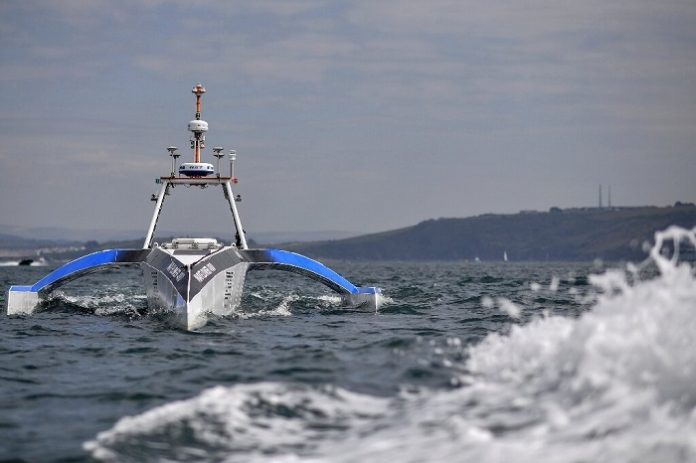The “Mayflower 400″—the world’s first intelligent ship—bobs gently in a light swell as it stops its engines in Plymouth Sound, off England’s southwest coast, before self-activating a hydrophone designed to listen to whales.
The 50-foot (15-meter) trimaran, which weighs nine tonnes and completely autonomous navigation, is preparing for a transatlantic voyage.
On its journey, the vessel, covered in solar panels, will study marine pollution and analyze plastic in the water, as well as track aquatic mammals.
Eighty percent of the underwater world remains unexplored.
Brett Phaneuf, the co-founder of the charity ProMare and the mastermind behind the Mayflower project, said the ocean exerts “the most powerful force” on the global climate.
Having a ship without people on board allows scientists to expand the area they can observe.
A variety of technology and service providers have contributed to the project with hundreds of individuals involved from nations including India, Switzerland, and the United States.
Smart captain
The non-profit venture will offer the data gathered by the project free of charge. The information could be of particular use to the future of commercial shipping.
The autonomous ship is scheduled to embark on May 15 if the weather is favorable and permission is granted by British authorities.
The journey to Plymouth, Massachusetts—the same voyage made by pilgrims on the original “Mayflower” in 1620 as they sought a new life in America—will take three weeks.
While the Mayflower 400 voyage has been delayed because of the pandemic, at least no one will fall ill on the trip.
No one will get bored or tired or sick on this one. So it can take as long as it likes to do science.
Sitting alongside him were three computer technicians checking the equipment remotely.
Construction of the trimaran, which is automated from the robotic rudder that steers it to the diesel generator that supplements its solar power, took a year.
Developing its “smart captain”, the onboard artificial intelligence, took even longer as the computer has had to learn how to identify maritime obstacles by analyzing thousands of photographs.
Lack of regulations
The “Mayflower 400” also had to be taught how to avoid collisions and first went to sea for “supervised learning”.
Robotics and software engineer Ollie Thompson said that by running a “number of scenarios” the ship can learn “what are good actions, bad actions, so safe and unsafe”.
So if it makes a mistake, the boat can correct itself “and then learn itself,” he added.
Similar robotic data collection has been ongoing in space for decades.
While the ship is totally autonomous, the team will monitor the ship 24 hours a day from England, ready to intervene remotely in case of danger.








